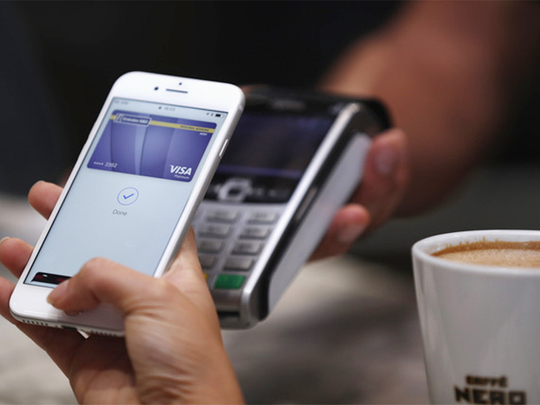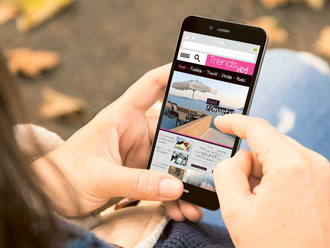
Dubai: Leave your wallet behind when you head to the coffee shop this morning. Just remember to bring your iPhone.
Apple Pay, the company’s digital wallet, launches in the UAE today. Anyone using credit cards from six UAE banks - Mashreq, Emirates NBD, Emirates Islamic, RAK Bank, HSBC, or Standard Chartered - and having an iPhone 6 or later will be able to use Apple Pay.
Here’s how to set up and use Apple pay in the UAE.
“We are incredibly excited to bring Apple Pay to the UAE starting October 24, so customers can have an easy and secure and private way to pay in stores, in apps and on the web and, of course, using the devices they carry with them every day,” Jennifer Bailey, VP Internet Services, Apple Pay, told Gulf News in a phone call from Cupertino, California.
Apple Pay can be used anywhere that uses a contactless payment terminal, such as the wireless credit card readers available in most retailers around the UAE.
The UAE, along with Sweden, Finland and Denmark, will bring the total number of countries with Apple Pay to twenty. This will be the first time the service is available in the Middle East. Apple Pay will compete directly with Samsung Pay, launched in April, and BEAM, an e-payment service available since 2012.
Security, simplicity used to sell Apple Pay
The launch in the UAE comes as the country continues to see increases in e-commerce
Deciding to launch Apple Pay in the UAE wasn’t done out of whimsy. When choosing whether to launch the mobile wallet in the UAE, the Cupertino-based company looked at several factors.
According to Bailey, the company considers such factors as the iPhone base and the use of credit cards.
“Recent studies have indicated that card spending has increases substantially over the last couple of years, and that’s one of the key signs of accelerated growth towards a cashless environment,” Bailey told Gulf News.
“As you know, moving towards cashless transactions is part of the UAE’s government strategy, which has been supported by many of the leading banks in the market. With the rollout of Apple Pay, we believe more consumers will encouraged its use and accept making contactless payments in the UAE.”
Many consumer in the region have long been suspicious of sharing their credit card details online. Bailey said the company is actively try to inform consumers about the security details around Apple Pay.
“We designed Apple Pay from the beginning with a very robust security approach,” she said. “The credit card [information] is not stored on the iPhone, or on Apple Servers, or shared with merchants.”
She added that when you use Apple Pay, the company doesn’t know what you bought, where you bought it, or how much you paid for it. If you lose your phone, any data or cards associated with the phone can be removed remotely.
Apple Pay uses a process called “tokenization” to make payments secure. A token replaces all of a user’s unique, sensitive data with information that cannot be used in any other way. Users will be able to see a short list of all recent payments made with Apple Pay, but that’s it.
The launch of Apple Pay in the UAE comes as the country continues to see an increase in e-commerce.
Digital wallets have been getting increasingly popular in the UAE, even if their use has not grown elsewhere in the Gulf Cooperation Council (GCC). The growth here is being attributed to development of the country’s payment infrastructure, especially in terms of NFC-enabled POS (point-of-sale) terminals, merchant acceptance and developing user confidence in contactless payments, according to Rabia Yasmeen, Analyst - Services & Payments at Euromonitor.
Euromonitor estimates that 50 per cent of the POS Terminals in the UAE are NFC enabled and expects growth of nearly 52 per cent during the year. They estimate the number of transactions through digital wallets would reach nearly 1.7 million during 2017.
“2017 has been an important year regarding the growth of digital payment platforms in the UAE with the launch of Samsung Pay and announcements made for Apple Pay are expected to lead to exponential growth in digital payments in the country. These developments are expected to increase a wider user base for digital wallets due to brand names backed by trusted technology,” Yasmeen said.
Nearly 2 per cent of the retail sales comes from online retail in the GCC, according to Euromonitor. The region’s internet retail sales are estimated to be $4.5 billion in 2017, with nearly 73 per cent accounted by Saudi Arabia and the UAE.
Euromonitor estimates the total digital payments of around $8 billion in Saudi Arabia and $10 billion in the UAE. Transport and retail are the biggest sectors, followed by consumer food services.
Apple Pay was originally launched in 2014 in the US, and launched internationally in 2015. Apple says it processes 90 per cent of all payment made with NFC.












